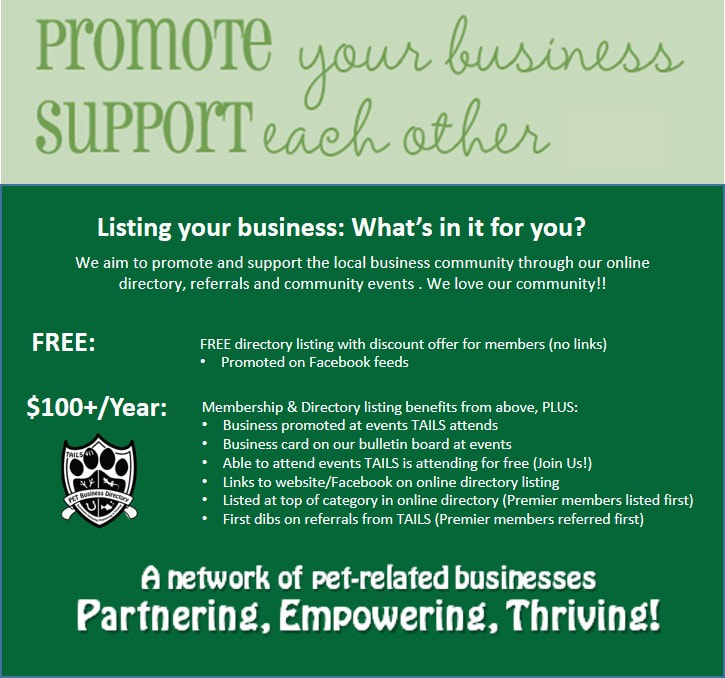TAILSRewards Members: $5.00 off New Client Pet Consultations
|
General Business Listings:
Businesses listed below are not TAILS411 members, sponsors or TAILSRewards merchants and therefore have not been vetted by TAILS Foundation Inc. If your business is listed below and you would like to become a member, sponsor or TAILSRewards merchant, please Contact Us today!! Chiropractic Services:
Helping Hands Chiropractic 208-664-0444 Springwater Veterinary Services 208-651-0973 Northwest Animal Chiropractic Large Animals 208-704-8579 Small Animals 208-664-0444 Rehab & Therapy: Springwater Veterinary Services 208-651-0973 Northwest Canine Aquatics 509-226-3211 VOM Technology 208-640-3430 Pet Health & Nutrition: Saige Wellness 208-620-0175 Massage/Reiki: Happy Tails Canine Massage 509-294-0734 Peaceful Paws Massage/Reiki 509-768-5939 Fern Meadows (Horse) 208-714-6740 Acupuncture: Springwater Veterinary Services 208-651-0973 Northwoods Veterinary Hospital 208-683-2708 Legacy Animal Medical Center- Liberty Lake 509-926-8387 |
Alternative therapies
Lots of different therapies fall under the umbrella of alternative medicine (also called holistic medicine). But many of them have this philosophy in common: consider and treat all aspects of the patient's life, not just the symptoms. Here are a few of the most popular ones: Acupuncture involves inserting fine needles into specific areas on your dog's body to balance the flow of energy, or chi. This ancient Chinese practice is often used to control pain and cure chronic ailments. Chiropractic care provides hands-on spinal adjustments for your dog, just like you'd get, to relieve pain. Herbal treatments use plant remedies to treat a variety of ailments. For example, alfalfa is used for arthritis and allergies. Homeopathy aims to jumpstart the body's own healing response with very diluted substances that cause the same symptoms the dog is suffering from. For instance, a dog with diarrhea would be given tiny amounts of a substance that causes diarrhea. Massage lowers the level of stress hormones in the body, increases circulation, eases pain, and may even give the immune system a boost. Nutritional supplements are used to make up nutritional shortfalls in the diet by supplying extra vitamins, minerals, fatty acids, and amino acids. What vets think about alternative medicine. Some veterinarians don't care for alternative therapies since, unlike conventional veterinary medicine, most of them haven't been scientifically proven to work. However, that doesn't mean they're ineffective; it just means they haven't been put to the test in well-conducted studies. And there are plenty of vets who are open to the alternative approach. Some veterinary schools now provide tracks in holistic medicine, and some vets offer alternative therapies alongside conventional treatments. Use Common Sense You wouldn't give your dog a conventional medication without knowing anything about it or consulting with your vet. The same thing goes for some alternative therapies. You won't do any harm if you massage your dog, but giving incorrect dosages of potent herbs or supplements is another story. Just because a substance is natural doesn't mean it's harmless. |




